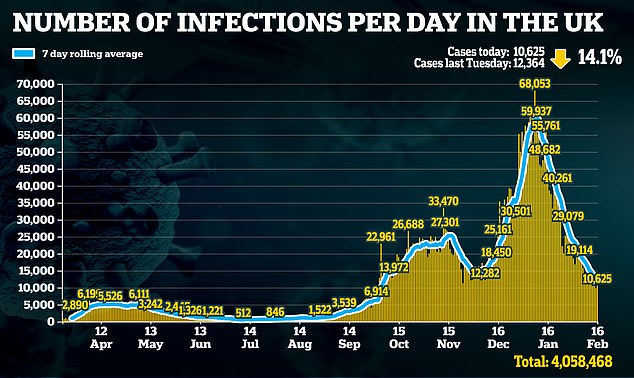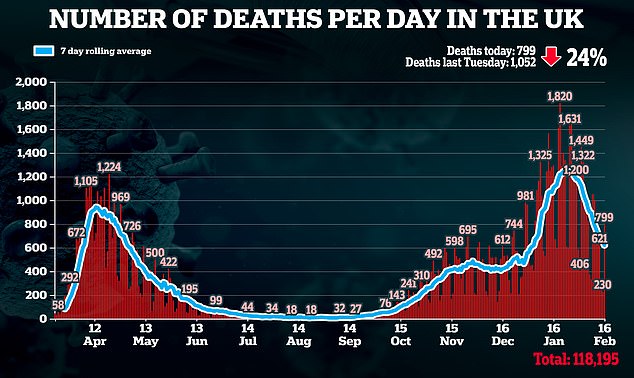Britain could ease lockdown sooner if No10 was really following the data, a top Sage expert claimed today.
Professor Mark Woolhouse, an infectious diseases expert from Edinburgh University, told a parliamentary committee today that the data was pointing to an ‘earlier unlocking’.
‘I completely agree that we don’t want to be overly focused on dates, not at all. We want to be focused on data. But the point I’d make about that is the data are going really well,’ he said.
And re-kindling hopes of a loosening of restrictions soon, he added: ‘My conclusion from that is if you’re driven by the data and not by dates, right now, you should be looking at earlier unlocking.’
He also said schools were too slow to reopen after the first wave, when infections were very low throughout the summer months.
Professor Dame Angela McLean, who also appeared before the committee, warned some restrictions – possibly including wearing face masks and social distancing – must stay in place all year to avoid a third wave.
The Sage member and chief scientific adviser to the Ministry of Defence said: ‘I think the reason we didn’t have a summer wave last summer was mostly the interventions that we put in place.’
She added: ‘It is currently summer in South Africa where they’re coming to the end of the second wave, so I think that tells us it is possible to have a horrible wave in the summer.’
She also called for ministers to set an ‘acceptable’ level of infections going forward. Dame Angela said: ‘It’s one of the things we’ve cried out for again and again – could somebody in a position of political power tell us what is an acceptable number of infections?’
Britain’s infections have tumbled since lockdowns were imposed nationwide, after 10,625 were recorded yesterday which was three quarters below the peak in January. Deaths have also plummeted since the peak, and hospitalisations are also continuing to drop.

Professor Mark Woolhouse, an infectious diseases expert at the University of Edinburgh, said the data was pointing to an ‘earlier unlocking’


SOUTH AFRICAN VARIANT WAS IN BRITAIN IN OCTOBER, TOP SCIENTIST SAYS
The South African variant of coronavirus was in Britain in October but was missed by scientists, a top Government expert says.
Addressing Parliament’s Science and Technology Committee, Professor Sir John Bell revealed that while the UK had been good at sequencing strains – it was not as good at identifying them.
‘In all honesty we did a lot of sequencing but we weren’t that great at identifying the variants when they were there,’ he said.
‘The South African variant had been fumbling around in the database since about October, November before we actually spotted it.’
Scientists are concerned by the variant because it contains the mutation E484K, which makes vaccines less effective.
But studies show that those who get their jabs before they catch the variant are still protected from serious illness and death.
Mass testing has been carried out in several postcodes in response to cases of the variant, in an attempt to snuff them out before an outbreak takes off.
Advertisement
Professor Woolhouse, from the University of Edinburgh, told Parliament’s Science and Technology Committee added that the benefit of a lockdown halves every two weeks – providing the R rate is constant – as they become less useful the longer they are in place.
‘You get half the public health benefit of that six month lockdown in the first two weeks,’ he said.
‘And the next two weeks is only half the benefit again, and then half the benefit again. so the actual public health benefit you’re getting from lockdown diminishes overtime if the R number is constant.
‘I think that changes your view of how soon you should be trying to get out of lockdown because it becomes ever harder to justify and I think that lesson right now is underlined by a much weaker link between hospital and who is going to end up dying.’
When asked about the length of the first lockdown, he warned the Government had been too slow to lift restrictions on schools and outdoor activities.
‘I think we probably could have considered reopening schools much sooner in the first lockdown,’ he said.
‘The other thing, quite clearly, is outdoor activities. Again, there was evidence going back to March and April that the virus is not transmitted well outdoors.
‘There’s been very, very little evidence that any transmission outdoors is happening in the UK. Those two things, I think, could have been relaxed sooner in the first lockdown.’
Warning that the UK could experience a third wave in the summer if all restrictions are abandoned, Professor Mclean said: ‘I think the reason we didn’t have a summer wave last summer was mostly the interventions that we put in place.
‘It’s pretty difficult with something this new to measure how big the seasonal effect is.
‘So first of all we’re still collecting epidemiology and of course all the epidemiology we see is with many different rapidly changing interventions in place.
‘So that makes it really difficult to untangle what changed because it was a different season and what changed because the way people were mixing is different.
‘It is currently summer in South Africa where they’re just coming to the end of the second wave, so I think that tells us it is possible to have a horrible wave in the summer.’

Top experts have warned the UK could face a coronavirus wave over the summer. They pointed to South Africa, where infections have spiked in their summer months. The country is in the southern hemisphere, meaning its summer falls between November and February
NHS chiefs have today warned Covid-19 cases should plummet to under 50,000 before Boris Johnson starts to lift restrictions.
The most recent figures suggest there are 695,400 people in England with the virus – or 14 times above the level they are calling for.
NHS Providers chief executive Chris Hopson said there was a ‘pretty clear view’ that ‘that number needs to come down to around 50,000’.
He has urged Boris Johnson to focus on ‘data, not just dates’ when the Prime Minister sets out his road map out of lockdown on Monday.
Mr Hopson’s organisation, which represents NHS trusts, has set out four ‘tests’ which should guide easing: getting case numbers down, reducing pressure on the NHS, further strides in the vaccination programme and an effective strategy to control future outbreaks.
‘If you look at where we are against those four tests, each one of them tells you that we’re still some way away from being able to start relaxing restrictions,’ Mr Hopson told BBC Radio 4’s Today.
‘We had 500 Covid patients in hospitals in September and yet, 15 weeks later, we had 34,000 patients, and we were perilously close to overwhelmed.
‘So, what that says to you is that you just need to be really careful before you start relaxing the restrictions prematurely.’
Source link : https://www.dailymail.co.uk/news/article-9269457/Britain-ease-lockdown-SOONER-No10-really-following-data.html











